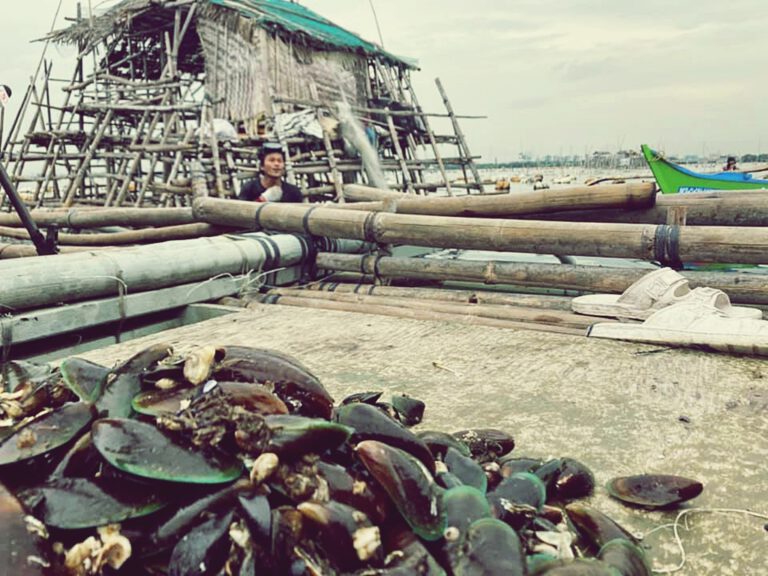
Mussel farm in Bacoor City, Cavite province, Philippines. Photo by Pambansang Lakas ng Kilusang Mamamalakaya ng Pilipinas (National Federation of Small Fisherfolk Organizations in the Philippines, PAMALAKAYA)
The Southeast Asia Sub-Region of the Civil Society and Indigenous Peoples’ Mechanisms (CSM) for Relations with the United Nations Committee on World Food Security (CFS) expressed its support to the struggle of small fisherfolk in Cavite province, south of Manila in the Philippines, defending their mussel and oyster farms, and other fisheries structures on Manila Bay. This is amid the issuance of an order by the Department of Environment and Natural Resources (DENR) to dismantle them with a deadline last September 7.
“The Philippine government is obviously callous and disrespectful of fishing rights and paradoxical of common sense that food production under the pandemic is of utmost importance. As early as June 2020, United Nations Secretary-General António Guterres has warned of a global food crisis due to the pandemic and called for appropriate actions to prevent it. But Philippine President Rodrigo Duterte seemed senseless as it is ordering the exact opposite,” Sylvia Mallari, CSM Coordinating Committee representing the Southeast Asia Sub-Region, said in a press statement.
Mallari reminded the DENR that the Supreme Court mandamus for Manila Bay Rehabilitation clearly ordered for the Department of Agriculture through the Bureau of Fisheries and Aquatic Resources “to improve and restore the marine life of the Manila Bay. It is also directed to assist the local government units (LGUs) in Metro Manila, Rizal, Cavite, Laguna, Bulacan, Pampanga, and Bataan in developing, using recognized methods, the fisheries and aquatic resources in the Manila Bay.”
“The agency is like a broken record in using the mandamus as an excuse to destroy food systems when it actually orders the development of fisheries resources and not its destruction. The Duterte government is weaponizing the order against the small fisherfolk sector, which is globally recognized as vulnerable and marginalized, and needing adequate support and assistance, not of displacement and oppression,” she added.
She also cited that the small fisherfolk sector is recognized as vulnerable and marginalized in international and even national laws. The United Nations (UN) in its many covenant and resolutions, such as the Sustainable Development Goals approved by the UN General Assembly, and the UN Food and Agriculture Organization (UN FAO) Voluntary Guidelines for Securing Sustainable Small-Scale Fisheries in the Context of Food Security and Poverty Eradication, has promoted the access rights of small-scale fisherfolk to resources, and the right to security of tenure, or briefly fishing rights.
“The right to work or the preference of the fisherfolk sector to source their livelihood from the sea is on the International Covenant on Economic, Social and Cultural Rights. In the Philippine laws, Social Reform and Poverty Alleviation Act, clearly stated that the small fisherfolk are needing support and assistance. Thus, the DENR order only exposes how obtuse the Philippine government, when it comes to the protection of marginalized sectors, and worse, it is warlord-like, alien to international covenant for human development standards,” Mallari criticized.
Mallari urged the UN Committee on World Food Security (CFS) to press the Philippine government to revoke its order of destruction of community-based food systems in Manila Bay.
“This issue clearly falls on the UN Secretary-General António Guterres’ warning of a human rights crisis. The approval of a reclamation project in Bacoor and displacement of fisherfolk families were carried out since the lockdown last year. The Philippine government is taking advantage that the civil society organizations (CSO) are locked down and with limited physical mobility, to execute their anti-people and anti-fisherfolk agenda. We urge the civil society organizations around the globe to support the struggle of Cavite fisherfolk against the order to destroy their food systems and sources of livelihood,” Mallari ended. ###